Staff Inquiry: Which Generally Loved Film Do You Dislike?

Arlin is an all-around film person in Oakland, CA. He…
One of the internet’s favorite pastimes is letting people know why the things they love are actually terrible. It can be frustrating sometimes, being the only one in the world to know the true value of a film when it seems like the whole world has had the wool pulled over their eyes.
In this edition of Staff Inquiry, the FI team joins in on the fun as we get our full troll on. This might actually be the end of Film Inquiry, since we’ll most likely refuse to speak to one another after this runs. Well, it’s been a good run…
Alistair Ryder – The Seventh Seal (1957)

dir. Ingmar Bergman
Before his death, Ingmar Bergman, one of the leading directors of 20th century cinema, confessed that even he found his own films depressing. In the case of The Seventh Seal, his international breakthrough that got him recognized as the first Swedish master director, a pervading sense of gloominess is taken to levels beyond parody. The only thing separating it from a Tim Burton film is that it is irritatingly solemn about its gothic kitsch, never understanding how ridiculous its disposition on the nature of life is. It’s like an existential movie devised in the head of an angsty teenager whilst studying gothic literature for the first time – it is miserable purely for the sake of being miserable, ensuring it is never anything other than tedious to watch.
I can’t fully take against The Seventh Seal’s depiction of Swedish life in the middle ages, which doesn’t shy away from the horrors of then-everyday life in the midst of the plague. However, the fact that such a grim element is twinned with the campy framing device of playing chess with death to determine the continuation of life doesn’t soften the blow of the harsh elements so much as it makes it feel that miserablism is nothing more than a style choice for Bergman.
He has a keen historical eye and can effortlessly portray a long-forgotten depressing reality. But he continuously undercuts it by combining it with a fantasy element that is purely silly, yet is inexplicably treated with more seriousness. It is a film about existentialism that feels like a case of style over substance. There is nothing human in The Seventh Seal, just boorish academic monologues about the meaningless of life. Life isn’t meaningless, but The Seventh Seal ultimately is – a film that should make the eyes of everybody but the most nihilistic gothic teenagers roll into the back of their skull.
Mike Daringer – Breathless (1960)
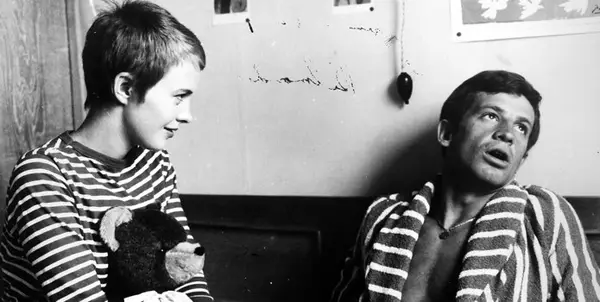
dir. Jean-Luc Godard
I can’t stand Breathless. In bad pun form, all I can say is that it simply doesn’t take my breath away.
Breathless is one of those movies that cinephiles lose their minds over, and I find it’s all hyperbole. That’s not to say that Jean-Luc Godard isn’t an influential filmmaker, or that French New Wave cinema wasn’t a long-time coming rebellion against the last few years of Old Hollywood. But, and do I stress but, Breathless is utter garbage.
Why it’s highly regarded amongst snobby critics I’ll never understand. It breaks the 180 degree rule (which, as we all know, is more like a suggested guideline) a dozen times, and has some of the worst general editing for a recommended masterpiece that I’ve ever seen. And not just that, but the cinematography and sound design are sophomoric. All right, Godard, you’re such a damn provocateur. It might come in at number 14 on Sight and Sound’s Best Movies of All Time lists, and sure people who claim exclusivity on the filmic canon may hold it aloft as a sacred parchment, but I know it’s nothing but the emperor’s new clothes. Alphaville – now there’s Godard‘s pièce de résistance that everybody should be getting behind.
Alex Lines – The Rocky Horror Picture Show (1975)
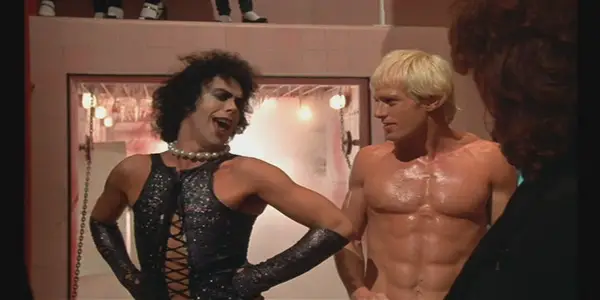
dir. Jim Sharman
As a significant piece of pop culture and a landmark in cult cinema, I understand why people love The Rocky Horror Picture Show. Progressive in its depiction of alternative lifestyles and a celebration of being different, it is a film which went from a bombing theatrical release to an incredibly popular visual experience, combining theatre interactivity and transforming the music into a soundtrack for a cinematic dance floor. But the film does absolutely nothing for me. I think the structure is incredibly stilted, the story (whilst being satirical) is unfocused, and the songs are quite forgettable.
There’s quite a few musicals I’m a fan of, such as Les Miserables and Phantom of the Paradise, so I really wanted to like RHPS, even though I’ve had Time Warp pumped out on every party compilation throughout my childhood. The film’s loose reality combined with its confronting visuals fail to incite any form of excitement or engagement, making its brief 90-minute runtime extremely painful to sit through. The visual style employed in the film is inconsistent and the main protagonists are completely lost in its constantly shifting narrative. For me, The Rocky Horror Picture Show is more important for what it created, rather than what it actually is.
Dave Fontana – Slumdog Millionaire (2008)
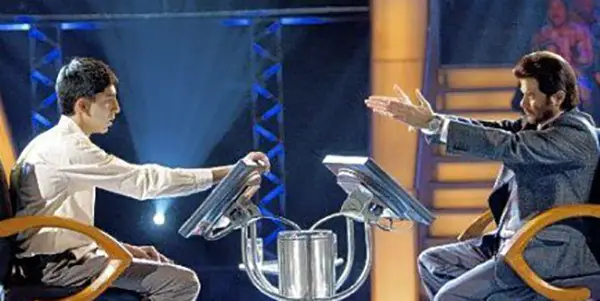
dir. Danny Boyle
Slumdog Millionaire was a film that won over both critics and audiences when it premiered in 2008, to the point where it went on to sweep the Oscars and win Best Picture. But was it really all that deserving? I’d like to argue that no, it was not. It might actually be one of the most overrated Best Picture winners of the last ten years.
Slumdog tells the story of Jamal Malik, a poor, orphaned boy who lands a spot on India’s version of Who Wants To Be a Millionaire. Despite all odds, Jamal gets much farther on the show than most people of his limited education. Why, do you ask? The film answers it for us: it is written. But what is written, exactly? In flashback, we learn just how nearly every question of the game show is conveniently related to some significant event in Jamal’s life. And so, we are lead to believe that all these terrible things happened in order for Jamal to win money on a game show and finally be able to afford a happy life for himself and for the supposed love of his life, a beautiful girl named Latika.
So what? We’re supposed to believe that Jamal and Latika ride off into the sunset and live happily ever after? For a film that prides itself on presenting the harsh reality of a third-world country, such a fairy-tale premise is just laughable to me. Why is Jamal so special, that he is “destined” to win all this money, instead of the many other slumdogs that still live in misery? He literally does nothing commendable throughout the entirety of the film, and most of the time is just a lovesick puppy dog chasing after a girl that he not only knows absolutely nothing about due to only knowing her as a young kid, but also at one time betrayed him and left him for his brother. Really? Is this the message that the film is trying to portray?
While I understand that Slumdog Millionaire was attempting to at least shed some light on this state of the world, I don’t see why the game show aspect was therefore even necessary. Why not just present a gritty, realistic portrayal of poverty, such as in 2002’s brilliant City of God? It’s even more disappointing to me because the film is directed by Danny Boyle, who has created such inspired features as Trainspotting, Sunshine, and 127 Hours. Feel free to hate me for it, but I just never understood why Slumdog Millionaire is so universally loved.
Jay Ledbetter – Mr. Smith Goes to Washington (1939)
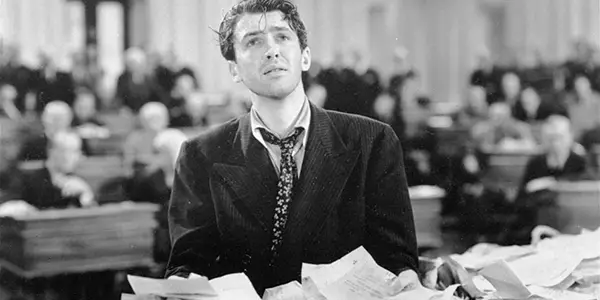
dir. Frank Capra
I am all about positivity. “Darkness” in film often gets misinterpreted as “complicated and nuanced,” when it is not deserved. Just because a film makes you feel bad, doesn’t mean it is a smart reflection of modern (although it certainly doesn’t disqualify it from that distinction, either). Positivity and optimism is important and we need to have our hope in humanity reinforced, or enforced for the first time, every now and then.
But this hope is for naught when there is no darkness to compare it to; this is the problem with Frank Capra’s Mr. Smith Goes to Washington. The optimism in the film is more irritating than anything else. Jimmy Stewart’s so-called protagonists are never doing anything more than taking up screen time. There is nothing revelatory about the world of politics or the effect of the Great Depression on the American Dream.
The plot summary of Mr. Smith is this: Jimmy Stewart is a good guy with little experience in politics. Jimmy Stewart becomes a Junior Senator and proposes a bill to the stubborn Senate. Everyone realizes that Jimmy Stewart has good, fair ideas and it is, in fact, possible for us to live happily ever after. There is a suicide attempt near the end of the film, but it is by a backstabbing, crooked senator – unlike Capra’s better film It’s a Wonderful Life, where it is Jimmy Stewart (the protagonist) who contemplates suicide and must find a way to reconcile with his checkered past.
In Mr. Smith, there is no black and white, just a glowing ray of sunshine that makes us all wish we had sunglasses, or maybe a blindfold. Dark things happening to a bad person isn’t true darkness, it is an optimistic view of justice. And that is all Mr. Smith is: optimism for optimism’s sake. It is easy to chalk this up to the times, but films like Gone With the Wind and even The Wizard of Oz show that we only know what good things are because we can juxtapose them with bad ones. When there is no sadness, we cannot define happiness, which Capra is not able to understand in Mr. Smith Goes to Washington.
Julia Smith – The Babadook (2014)

dir. Jennifer Kent
You have to get up early to find me truly hating on a movie. Occasionally it happens that I don’t like a film, and the media’s ensuing enthusiasm for it drives me to anger, but most of the time I just don’t get it. What are they seeing that I’m not? I’m a big believer in “to each their own”. But for a film like The Babadook to be so widely regarded just confuses me.
From the moment I heard about the The Babadook, a 2014 Australian independent horror by filmmaker Jennifer Kent, I was excited. It sounded awesome. Plus, independent horrors from faraway lands have found themselves a highly regarded niche in the film watching community, possibly because they have already impressed enough to have crossed countries and many different kinds of audiences to get to us. However, when I finally saw it, I was very disappointed indeed.
This is not a very well-made film. The camerawork is rough, something I wouldn’t have really focused on in an independent film, if the acting and directing wasn’t less than good. Essie Davis (as the mother, Amelia) and Noah Wiseman (as son Samuel) aren’t very good in it; they’re even occasionally annoying. Granted, they get better as the film goes on, but only in that they climb up to average. Jennifer Kent’s story is solid – the beats are all in the right places, but the scenes and dialogue aren’t anything special. Some of the scenes even feel incongruous to the film as a whole.
However, what bothers me more than anything about The Babadook is that it just isn’t scary. There are one or two creepy moments, but really there is nothing to get excited about. When people tell me that the film is a brilliant horror I think they can’t have watched many good horror films. I want to sit them down in front of The Others, A Tale Of Two Sisters, and The Shining, and ask them to compare and contrast with The Babadook. But even without those other horrors for comparison, the film isn’t anything better than average, and even quite poor in places.
I understand if you love The Babadook. If it scares you and it brings you joy I’m not going to argue with you, but don’t try to tell me it’s a horror masterpiece. It’s not, and it doesn’t even come close.
Jacqui Griffin – Crash (2004)

dir. Paul Haggis
If you’re expecting me to be in the least bit balanced about my hatred for this movie, I would move along to the next person. I have an unrelenting, fiery loathing of the film Crash (2004). It is super important that you don’t confuse this with Crash (1996), starring James Spader, which is a work of genius. Enough on what will henceforth be known as the “real Crash“. On to the Oscar-nominated, derivative piece of tripe that somehow people confused as groundbreaking and daring.
Paul Haggis‘s poor attempt to break down racism and shatter our world view had me offended within the first five minutes. This film had SO MANY chances to win me over. Don’t get me wrong – the acting is all very good, the directing is fine, lovely soundtrack and all that. But if you want to make a statement on racism, should the first major non-white characters we see really turn out to be car stealing gangsters? Probably not.
Better yet, of the two police officer characters we get to know over the course of the film, should we be left feeling sympathetic with the racist asshole while the conflicted moralist commits cold-blooded murder and leaves the body out to dry? But worse, far worse, is the lesson the film ultimately teaches. And that lesson is that racism is okay. Don’t believe me? The film culminates in a tense confrontation between a Middle Eastern man and a Hispanic man, and the Middle Eastern man threatens the Hispanic man with a gun, and just as the Hispanic man’s little girl runs towards his arms, the gun goes off. But don’t worry, she’s fine. THAT’S BULLSHIT.
If you want to leave a lasting lesson about the pain caused by stupid shit like racism that little girl should’ve died bleeding in her father’s arms. That may be a cold attitude, but it certainly would’ve been a better lesson than “you know what, if you’re racist, you’ll probably get a second chance.” Fuck Crash.
Arlin Golden – The Dark Knight (2008)
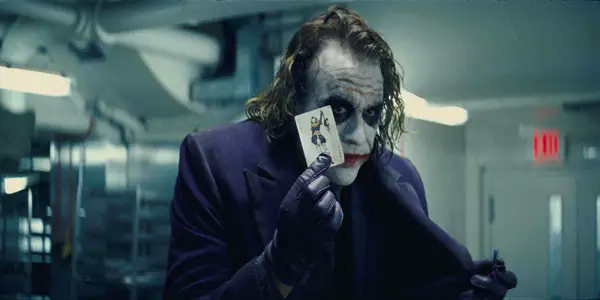
dir. Christopher Nolan
My gripe with the second of Christopher Nolan‘s modern Batman trilogy isn’t that it’s particularly bad; it’s that it’s just fine and certainly not great. It’s not even the best Batman movie. Not even the second best for that matter. We can maybe talk about third. Maybe. Probably fourth though. But The Dark Knight is just a totally fine, decent comic book movie and I just cannot comprehend the massive amounts of critical and cultural praise it received upon its release and continues to receive nearly a decade later. Know what else was a fine comic book movie? Sam Raimi‘s Spider-Man, and at least that movie was fun.
Nolan, for whatever reason, decided to suck out any joy or life for his take on the caped crusader, leaving only darkness and destruction in its wake. He even managed to take the fun out of the Joker (his name is the Joker!), giving him those grotesque cheek slits and blacking out his soul (and no, it’s not a good homage to the Joker in Alan Moore’s seminal “The Killing Joke”, it’s a perversion).
I also find the pervading fetishization about Heath Ledger’s role and subsequent death to be utterly distasteful, and furthermore inaccurate. Plenty of actors have played characters far more sinister and nefarious than the Joker without overdosing on prescription painkillers. Clearly, Ledger’s demons were deeper and long-gestating, and to suggest that it was the result of his method-acting in this film not only trivializes his condition but also mythologizes his tragic death.
One thing for which I will give the film credit is using Chicago and its iconic architecture to dazzling effect in creating Gotham and the film’s set-pieces. Everything else is just standard, run-of-the-mill, modern comic book action movie stuff; too many underdeveloped characters with too many diverging and converging plotlines, with a poor sense of pacing and nothing really truly ever being at stake. Those people on the ferry will never die and Batman will always win. Sure, he’ll feel bad inside about the death of his love interest, but we all know it just goes into the storage closet of things that drive him to vengeance along with the murder of his parents, which is about the extent of the character’s role anyway. And the thing about them being two-sides of the same coin? What an overused trope, please. So, The Dark Knight, I really have to ask you, why so serious?
Surely you must be very mad at at least one of us, why not let us know in the comments below?
In our next Staff Inquiry we’re getting our positivity on: we’ll discuss movies that are universally disliked, but that we actually love.
Does content like this matter to you?
Become a Member and support film journalism. Unlock access to all of Film Inquiry`s great articles. Join a community of like-minded readers who are passionate about cinema - get access to our private members Network, give back to independent filmmakers, and more.
Arlin is an all-around film person in Oakland, CA. He received his BA in Film Studies in 2010, is a documentary distributor and filmmaker, and runs Drunken Film Fest Oakland. He rarely dreams, but the most frequent ones are the ones where it's finals and he hasn't been to class all semester. He hopes one day that the world recognizes the many values of the siesta system.













